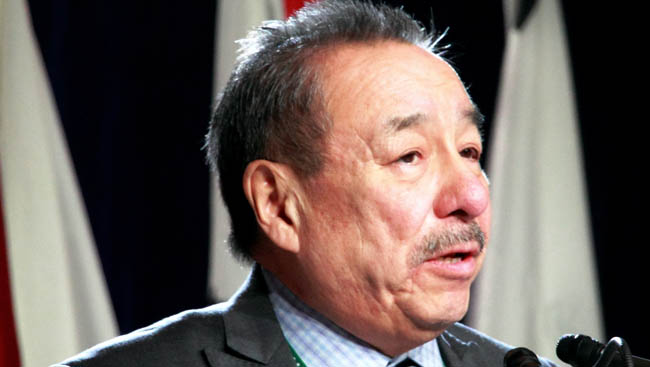Political Confederacy respond to Aboriginal Affairs document on questionable infrastructure funding re-allocations

TORONTO (November 13, 2014) — First Nation leaders in Ontario are not surprised by the federal government’s funding controversy. On Monday, the Canadian Press published an article revealing that Indian and Northern Affairs Canada (INAC) has been reallocating First Nation infrastructure funds.
The article referenced a document dated June 2013 to the Canadian Human Rights Tribunal (CHRT) on First Nations social and infrastructure funding. The document stated that INAC reallocated approximately $505 million in infrastructure dollars to social, education and other programs to try to fill the shortfalls in these areas. The Canadian Press referred to it as a case of “robbing Peter to pay Paul.”
“This is typical of how First Nations have been treated by the federal government over the years, especially this current government,” said Grand Chief Gordon Peters of the Association of Iroquois and Allied Indians. “There’s an accountability issue here and it’s representative of how the government approaches First Nations. INAC is not accountable to First Nations in any process. They introduce costly bills all the time that criminalize First Nations and no one has a problem with it.”
Ontario Regional Chief Stan Beardy echoed Grand Chief Peter’s sentiments, “First Nations are constantly under scrutiny over funding even though we have remote communities that continue to live in third-world conditions. Our schools are underfunded and the cost of living is tripled in northern communities but right-wing media continues to make us look like a tax burden to society.”
The Chiefs of Ontario Political Confederacy met in Toronto yesterday where the Ontario Grand Chiefs and Independent First Nations discussed INAC policies and budgets.
“The communities in Treaty 3 are vastly underfunded for basic needs like water, housing, and access. We have a number of communities like Shoal Lake No. 40 that have been under boil water advisories since 2000 as reported by Health Canada’s FNIHB Advisory Status Report,” said Ogichidaa Warren White, Grand Chief of Grand Council Treaty #3. “I just don’t understand how the government can take from infrastructure budgets to pay for other services when we’re underfunded in every sector imaginable.”
The Chiefs of Ontario Political Confederacy are concerned that infrastructure needs will exacerbate to $9.7 billion by 2018 if budget reallocations ignore real needs and the funding caps continue. “This is a classic example of hypocrisy, because First Nation funds are constantly under threats while they operate on absolute discretion. The federal government expedited the financial transparency act, which makes us accountable on two and sometimes three or four processes but the federal government doesn’t have to be accountable to anyone,” said Grand Council Chief Patrick Madahbee of the Anishinabek Nation.
“Keeping First Nations in poverty doesn’t make economical sense,” said Chief Ava Hill of Six Nations. “First Nations in Ontario alone have over 24,000 homes that are in desperate need of repairs where mould and poor insulation is common. Study after study has shown that there are major funding gaps in education even though the government is well aware that education is the best way out of poverty.”
“In the communities that I represent single moms and families on fixed incomes are paying $16 for a bag of milk with no promise for new jobs because of remoteness and access. The cost to heat our homes with deficiencies in construction leads to early death rates and it would be considered a crisis in any other part of the country,” said Grand Chief Harvey Yesno of the Nishnawbe Aski Nation.
The Chiefs of Ontario is a political forum and a secretariat for collective decision making, action, and advocacy for the 133 First Nation communities located within the boundaries of the province of Ontario, Canada. Follow Chiefs of Ontario on Facebook or Twitter @ChiefsOfOntario.


